October 19th, 2011
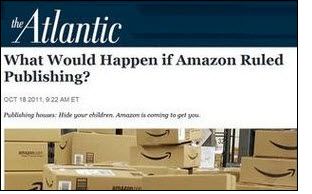
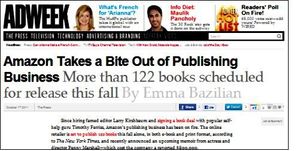 Ever since the New York Times discovered that Amazon.com has 122 new books in the works the blogosphere is filled with shrill cries that Amazon as a publisher threatens publishing. Wrong. That’s not the trouble with Amazon – Amazon as a book publisher is neither here nor there.
Ever since the New York Times discovered that Amazon.com has 122 new books in the works the blogosphere is filled with shrill cries that Amazon as a publisher threatens publishing. Wrong. That’s not the trouble with Amazon – Amazon as a book publisher is neither here nor there.
Amazon as a book retailer, however, is a growing problem both for authors and for publishers. In seeking to cement its extant competitive advantage Amazon sows discord in a marketplace that can ill afford the turmoil. Players like Seth Godin and DC Comics play along, apparently happy to make a near-term splash at the expense of the long-term health of the fragile book retail ecosystem.
Amazon the book publisher is hardly a blip on the radar. There are roughly 300,000 new English-language books published each year (depending on what fraction of a book they assign to self-published work). Even if Amazon expands its program by a factor of 10, it will still account for less than half of 1% of the books published. And, as far as I’m concerned, if Amazon corners the entire market of Seth Godin’s and Timothy Ferris’s oeuvre our publishing culture will certainly pull through.
Amazon.com the retailer is becoming an oligopolistic nightmare. Estimates vary as to the percentage of the U.S. book retail market the company controls, but certainly it’s over 50% for e-books. With the next largest online competitor at less than half that level (and shrinking), power is concentrated. Let’s face it: when it comes to new books, Amazon calls the shots. Like New York, New York, if you can make it there, you don’t need to make it anywhere else.
I’ll offer an audacious claim here – a statement of truth I hold as self-evident. Publishers, booksellers and authors are not rapacious despoilers of the economic well-being of the reading public. Books were not overpriced when the average retail price of a book was $15.43. But they are underpriced at $2.99. If new book prices seem high to you you can buy used books (and thanks to Amazon you can buy them used about six minutes after they go one sale as new). If you can’t afford the new or used hardcover, you can buy the paperback. New or used. If you can’t afford that, you can go to your public library. If you find yourself on a waiting list for a book that you must read today, rather than any of the other 5,769 books published this week, you can probably steal it by downloading it illegally online.
Meanwhile the average author makes a pittance. (In 1981 the amount was estimated at $5,000/year. The growth in self publishing drops the average.)
The entire publishing industry in the United States has annual sales of $30 billion.
What’s $30 billion?
That’s the estimated value of online gaming next year.
It’s a third of IBM’s annual sales, and the same as Apple Computer’s sales from July to September this year (though Apple makes a heck of a lot more profit on those sales than the publishing industry makes on its sales).
S&P projects Amazon’s current fiscal year sales will hit nearly $50 billion.
In the big scheme of things publishing is very small potatoes. (Epicurious has some yummy recipes for very small potatoes – I love roasted beets!)
![]() Writing has become badly debased when a $4.99 e-book is thought overpriced, but people will line up at six in the morning in front of an Apple store to pay $499 for the skinny tablet to read it on.
Writing has become badly debased when a $4.99 e-book is thought overpriced, but people will line up at six in the morning in front of an Apple store to pay $499 for the skinny tablet to read it on.
I’m not discounting the good that’s come from Amazon’s hard work in online bookselling. Jeff Bezos’s determination has made more books more readily available than was ever imagined possible. His hard work developing the e-book marketplace has opened up tremendous opportunities for authors to be discovered and to be read. So far so good.
What’s the downside?
1. You have to deal with Amazon, or your book won’t succeed.
If you are an author or a publisher you must sell your book through Amazon.com or your book will lose at least half of its potential sales. That gives Amazon disproportionate power in the marketplace. Yes, Barnes & Noble at one time controlled about a third of book retail. That wasn’t good either. They used to wield power similar to Amazon’s. But they don’t anymore. Seth’s latest e-book, Poke the Box, is not available from Barnes & Noble or Apple or Google or Sony. Only from Amazon. He apparently does not care.
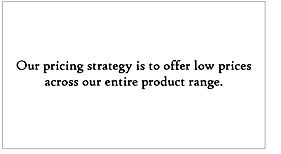
Is this clear?
2. Amazon low-balls pricing.
I’m all for holding down the price of airline tickets, prescription drugs, e-readers, tablets and pork belly futures. For reasons discussed above, I think that a retailer committed to undervaluing books and other creative endeavors is not, in the long run, performing a public service. Amazon is absolutely committed to the lowest possible book prices (I did a price comparison recently).
Amazon’s behavior in determining what Americans are allowed to read is not horrendous. But it’s real. And there are sufficient examples of Amazon’s abuse of this power to signal a warning.
4. Amazon does not support public libraries.
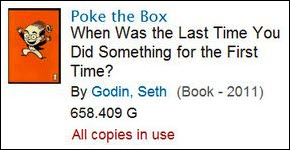 Ah, but Amazon enables public library borrowing through Overdrive, is the retort. True. And I think that Overdrive is doing an excellent job within the limitations of current copyright law to enable e-book borrowing. Which is to say that where previously you could not get Seth’s current ebook from your public library at all, now you can line up for a few digital copies, and if you should be so fortunate as to get to the front of the line, you can struggle though the inventive interface to read it, before it disappears – poof – at the end of the loan period. Amazon books via Overdrive is the equivalent of damning with faint praise.
Ah, but Amazon enables public library borrowing through Overdrive, is the retort. True. And I think that Overdrive is doing an excellent job within the limitations of current copyright law to enable e-book borrowing. Which is to say that where previously you could not get Seth’s current ebook from your public library at all, now you can line up for a few digital copies, and if you should be so fortunate as to get to the front of the line, you can struggle though the inventive interface to read it, before it disappears – poof – at the end of the loan period. Amazon books via Overdrive is the equivalent of damning with faint praise.
5. Amazon controls your comments and annotations
Amazon really pioneered the online book review system and created real value. I don’t think it claims copyright in the reviews that you write: you’re free to post your own elsewhere. Likewise your comments. Go ahead. Try.
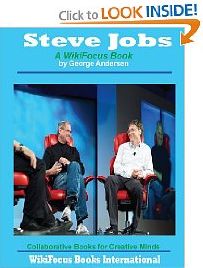 6. Amazon enables trash publishers
6. Amazon enables trash publishers
I’ve written to Amazon, as have others, to ask why, for example, it offers for sale 421,014 titles from Kessinger Publishing, one of several companies accused of copyfraud. Or why it offers George Andersen’s classic work, Steve Jobs, purloined, if that is not too harsh a term, directly from Wikipedia, and available for $1.99, of which I assume Amazon earns 59 cents.
7. Amazon does not support e-book standards
As part of Amazon’s proprietary e-book play, it continues to support a wretched e-book format called Mobi. How much longer it will perpetrate this indignity remains to be seen.
8. Amazon uses publishing as a weapon.
Amazon is not a real publisher, not by the definition I use on this site. A real publisher is committed to bringing the titles it publishes to the widest possible public. Amazon knows that it cannot reach as broad a public as the big New York publishers — it can hardly expect Barnes & Noble to play nice when it plays dirty. But Amazon does have market momentum. And by disrupting the existing supply chain it can offer more wampum to the wordsmiths.
Amazon has always appeared willing to sell books as a loss-leader, a Trojan Horse to bring well-heeled shoppers into its ecommerce fold. The company plays the long game, and plays it beautifully.
Why Monopolies are Troubling
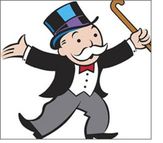 Amazon does not have a monopoly on selling e-books. But it has much of the power of a monopoly. I gather it would be called an oligopoly. Read more for definitions…
Amazon does not have a monopoly on selling e-books. But it has much of the power of a monopoly. I gather it would be called an oligopoly. Read more for definitions…
I’ve yet to see an argument that monopolies or oligopolies are good for anyone other than monopolists and oligopolists. If you can find one, please do let me know. In the meantime, here is a small smattering of the literature from the last couple of years on the nature of monopolies and their brethren.
What’s wrong with media monopolies? A lesson from history and a new approach to media ownership policy, 2010, by S. Barnett.
“It is almost universally accepted within advanced industrial democracies that concentration of media ownership within too few hands contradicts the basic tenets of democracy, threatening diversity of expression and risking autocratic control of communicative spaces.”
eMonopoly: Why Internet-Based Monopolies Have an Inherent “Get-out-of-Jail-Free Card”, 2011, George N. Bauer, et al.
“The Internet, the most widely used and most ‘dominant communications medium is unregulated and entirely at the mercy of domination by private commercial forces acting in their own self-interest.’ Antitrust enforcement in what has been dubbed the ‘new economy’ could be problematic because enforcement agencies, such as the Federal Trade Commission (FTC) and the U.S. Department of Justice (DOJ) lack the resources to cope with such a dynamic, rapidly advancing, and innovative economic model.”
Innovation: Fighting monopolies, 2010, by Li Gong.
“A history of communications technologies holds lessons for the Internet today, finds Li Gong. Innovation and business interests do not always mesh. Thomas Edison, the inventor of the light bulb and the phonograph, almost suffocated the US film industry in the early 1900s by controlling all the crucial patents for film technology…”
And so to summarize…
1. Don’t worry about Amazon as a publisher. Publishing original books is a marketing tool for Amazon, not a calling.
2. If you are an author or a less-than-enormous publisher recognize that Amazon is the new sheriff and from now on you’ll be playing the Amazon Way (12 used from $0.01 + $3.99 shipping).
— 30 —
 October 20, 2011. Tonight I was looking for a good recent book on the Semantic Web, as I’m considering attending the upcoming conference. An Amazon search included Web 3.0 – The Semantic Web: High-impact Strategies – What You Need to Know: Definitions, Adoptions, Impact, Benefits, Maturity, Vendors by Kevin Roebuck. The verbose subtitle was odd, but I assumed that some of the marketing copy had made it’s way up the page. The 336 page paperback book retails for $49.97. The Kindle version is $34.95 — pricey, but technical books are sometimes expensive as e-books. Still, something seemed off, so I sent myself a Kindle sample. Sadly, another rip-off of Wikipedia content, legal, yes; ethical, no.
October 20, 2011. Tonight I was looking for a good recent book on the Semantic Web, as I’m considering attending the upcoming conference. An Amazon search included Web 3.0 – The Semantic Web: High-impact Strategies – What You Need to Know: Definitions, Adoptions, Impact, Benefits, Maturity, Vendors by Kevin Roebuck. The verbose subtitle was odd, but I assumed that some of the marketing copy had made it’s way up the page. The 336 page paperback book retails for $49.97. The Kindle version is $34.95 — pricey, but technical books are sometimes expensive as e-books. Still, something seemed off, so I sent myself a Kindle sample. Sadly, another rip-off of Wikipedia content, legal, yes; ethical, no.
Kevin Roebuck, if he exists, is certainly prolific: Amazon offers 374 of his books, most of them selling in paperback for between $40 and $50.
Mike Clark sadly purchased the $49.97 paperback of Mr. Roebuck’s “Near Field Communication (NFC): High-impact Strategies – What You Need to Know: Definitions, Adoptions, Impact, Benefits, Maturity, Vendors” and reviewed it on August 13, 2011. In order to fill its 418 pages some filler was required, as Mike Clark writes that “those with even a passing knowledge of NFC will spot immediately that many topics listed as being covered by this title have nothing whatsoever to do with near field communication.” In fact if you sort Roebuck’s books by “Average Customer Review” you’ll find many other customers equally perplexed, and some of them very annoyed at Amazon.
The scam trails over to Lulu.com which offers 339 of his e-books. He’s got 359 titles on Waterstones, 468 on Borders and 364 on Barnes & Noble. Someone has lots of fun in store for them finding out just who is behind this venture. Hints: look for Ivanka Menken, Gerard Blokdijk and Australian-based Emereo Publishing Pty Ltd.
October 22, 2011, from Diane Mermigas: “Amazon is willing to sell its core tablet device at a loss of about one-quarter its list price and at painfully low margins because it is an efficient point-of-sale storefront in its expansive connected e-retail ecosystem. Its inventory of 18 million songs, books, movies and television episodes—as well as a healthy dose of Android apps — are hook offerings that lead to everything else.”
October 22, 2011: See “Barlcays Ups ‘Fire’ Estimate, Cuts EPS View.“
October 24, 2011: Amazon, Libraries and Ownership in the Digital Age by Guy LeCharles Gonzalez reveals that Amazon’s library deal is even worse than I thought. “If you get in bed with the devil, sooner or later…”
October 27, 2011: Are Cheap E-Book Prices Devaluing Authors’ Work? “The entire issue leaves us wondering, does the value of an author’s work get lost when the resulting books are priced at a pittance or is Amazon doing a service to the reader?…”
October 28, 2011: Another Perspective on Amazon as Publisher & Bookseller “…for Amazon, the increasing importance of e-books means that their overwhelming market power in that specific sub-market enables them to act as monopolists and to do some pretty crazy things. As you point out (and I alluded to here) being in a monopoly isn’t necessarily a bad thing – but there are few if any examples of when a monopoly situation lead to good market behavior and outcomes.”
November 17, 2011: Ted Striphas: “Really, it’s an oligarchy. Amazon, Barnes & Noble, and to a lesser extent, Apple have an almost exclusive lock on the commercial e-book market in the United States.”
January 11, 2012: The new imprint for garbage publishing is Hephaestus Books.
I see tonight that Seth Godin complained about the practice last November, although his focus was on the pathetic publishers, not on Amazon, his former partner, who is the second largest beneficiary of this garbage publishing.
May 23, 2012: The first alert comes from Seth Godin to some welcome news: Amazon bans junk ebooks. “We will not accept content that is freely available on the web unless you are the copyright owner of that content.” Hurrah!